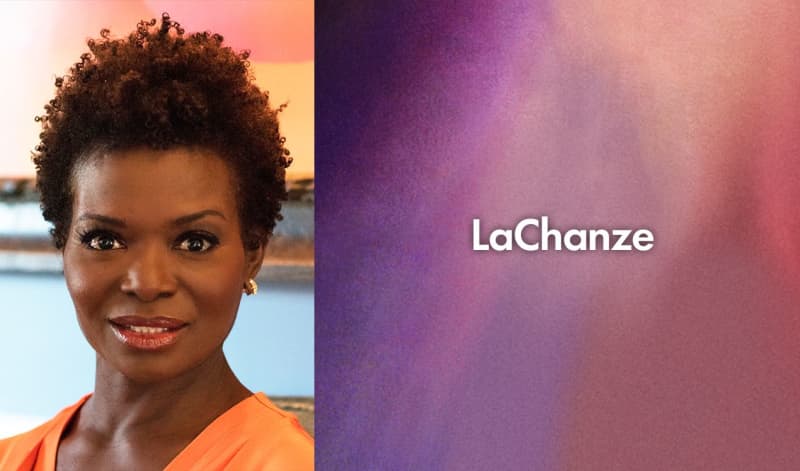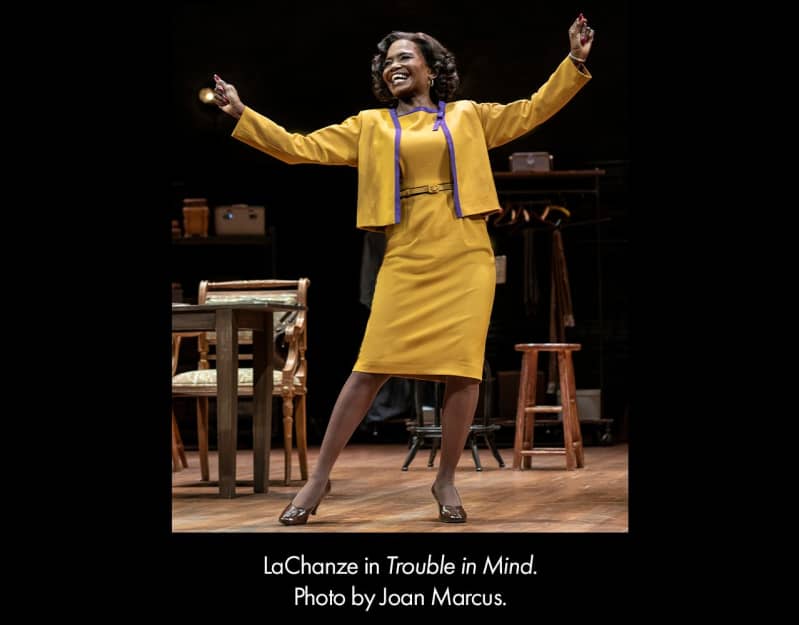Teaching Artist Nafeesa Monroe spoke with LaChanze about her work on Trouble in Mind.
NAFEESA MONROE: What is your theater origin story?
LACHANZE: I started my performing life as a child. We were a military family so we traveled quite a bit up and down the east and west coast of the country. My dad was in the Coast Guard, and at one point they separated and my mom settled with us in Connecticut. I had lived mostly in the South and wasn't around theatre at all. And when we moved to Connecticut, the proximity to New York was an hour, so my mom would take me to shows. And I just fell in love with it, and I got the bug from, believe it or not, Broadway TV commercials. I would see those commercials because I never saw them prior. I had seen Chicago and For Colored Girls... and The Wiz. I started seeing these Broadway musical commercials on television. I was like, "What is this? I want to do that." So, my mother enrolled me in a cultural arts center in New Haven, Connecticut, and that's kind of where I really sunk my teeth in and got the bug.
NM: Did you always know that you wanted to be an actor, or did part of you think, "Oh well I'm going to sing full time," or, "I want to do music"?
LACHANZE: I was a theatre dance major. I knew I wanted to dance in theatre. I've been studying dance since I was six years old, so my first professional job was “third girl from the left” in an ensemble. I was a tap dancer. I always sang; that was a part of my life also. I just always sang and never trained until I got to New York, actually. So my major at The University of the Arts was theatre dance.
When I got to New York, I got a job and the job went to Broadway. The rest was history. And when I learned that the singers had a better way than the dancers, I changed my entry on my auditions from dancer who sings to singer who moves well.
NM: I know both you and Charles Randolph-Wright have spent a lot of time with Trouble in Mind over the years, doing readings at various places. Now you’re finally stepping into the role of Wiletta for the show’s Broadway debut. Can you share with us what it is about this play that continues to inspire you?
LACHANZE: One of the things I love about Alice Childress's work is that she is unapologetic in her expression of Black characters. She has a natural, intuitive way of revealing the truth of a character, even if they're masking who they are—and I really love that about her. She even says, and I wrote it down in my script, she says that she is, "...trying to portray the have-nots in a have society. To interpret the ordinary." And when I started really working on [Trouble in Mind] and listening to how each character is so intimately defined, I agree completely that she just is able to strip all the stereotypical broad strokes of Black characters of a time that we believe, that we've seen, that we've experienced, and show you the humanity of the characters and what they have to deal with in order to live with this mask on in this society.
There's a moment in the play when, in the very beginning, [Wiletta] just walks in and she's greeted by the stage door man who knows her, who recognizes her, and he treats her with a certain kind of reverence. He says, "Oh I remember you. You were a singer." And she's like, "Well I'm acting in this play. This isn't a musical. I'm acting." And then he gives her this kind of respect and admiration, and then he leaves.
She has a private moment on stage where she takes...center stage, I'm imagining. She takes center stage and she reflects on singing that last musical that she was in with no one around. And we see, in that moment, that Wiletta is truly thrilled about this world and this work, and she's excited to have an opportunity to be an actor and not just the singer or the stereotypical character that she plays.
We see that in the first two pages. Alice shows you what this woman wants, what makes her vulnerable, how she's impressed by someone recognizing her. And then in the next page we see her dismissed by the first actor that walks in, and that makes her feel insecure about who she is. Some actors might just see that as her being angry and snapping, but what we see is that he just challenged something that she was feeling really good about herself, and now she's feeling vulnerable in this moment. And Alice shows that so well, I think, in her writing. She crystallizes human emotion. The vulnerability that we feel, in a line, in one word, in one sentence. You don't have to develop it. It's the unspoken, too, that she writes so cleverly.
NM: How then do you separate the “real life” versus the “story life” at the end of the night? How do you pack all that up, or do you not pack her up?
LACHANZE: That's an interesting question. It's so funny, when I was doing Celie in The Color Purple, that was the only role that I literally had to transition out of. It was so heavy. I had to spend time in my dressing room really shifting from Celie back to myself because it was so heavy. I don't imagine that I would need to do that with this as much because what I'm already feeling about who Wiletta is and where she comes from, I can relate to. It's not my story verbatim, but I know what it feels like to be a Black woman in her mid-50s about to star in a play. I've never done that on Broadway. I've done it Off-Broadway. But it's my first time leading in a play on Broadway. I've been in, I've never led.
I understand that feeling of excitement and anticipation. And with the layers of Wiletta that I find, I’m excited to be able to portray where she comes from. That's really important to me, being able to portray who she really is in every line. When you know that she's covering, when you can see behind the mask a little bit, when she starts to defend herself, when she's feeling vulnerable, when she's feeling strong, when she feels regretful. This is why I love Alice Childress so much— she just says what is happening in the scene, and she is very confrontational, but not meaning to be confrontational. But it is. It's just in your face. She does it with every character. I feel Wiletta is masking a lot of vulnerability and the struggles that she has at this time in history as a Black woman in the Jim Crow era. Living through that, what that must feel like for her? This [play] is [set in] a time she's still sitting on the back of the bus. She's still dealing with racism. She still doesn't have the rights that everyone else does.
[Wiletta is] dealing with those issues as well when she walks into the building. She might have just had an altercation with someone who called her “gal” or something outside, who knows? But she's walking into the building with all of that and still has the courage to have ambition, to want to be in the theatre, and to make herself better. She's constantly trying to improve, and that, to me, is just such a remarkable trait for any character.
NM: What advice do you have for aspiring artists, thinking specifically about our high school students?
LACHANZE: My advice would be to remember that this is a business, and that your business is your craft. So, always remember that you can't get lucky. Luck is a part of this because you might be in the right place at the right time and get that right audition, but if you're not prepared and don’t really understand the business, you will not go very far.
I'm always reminding young artists to study about the business of our industry. Learn the important people in the industry. Learn how they work, model your career journey after theirs. See where they're going. See who they surround themselves with and be in that company. It's a business, so you want to be with the right people doing the right thing at the right time.
NM: How does it feel for you to be a part of Trouble in Mind finally going to Broadway?
LACHANZE: I'm so excited. I'm so excited. I cannot wait to sink my teeth into Wiletta.


